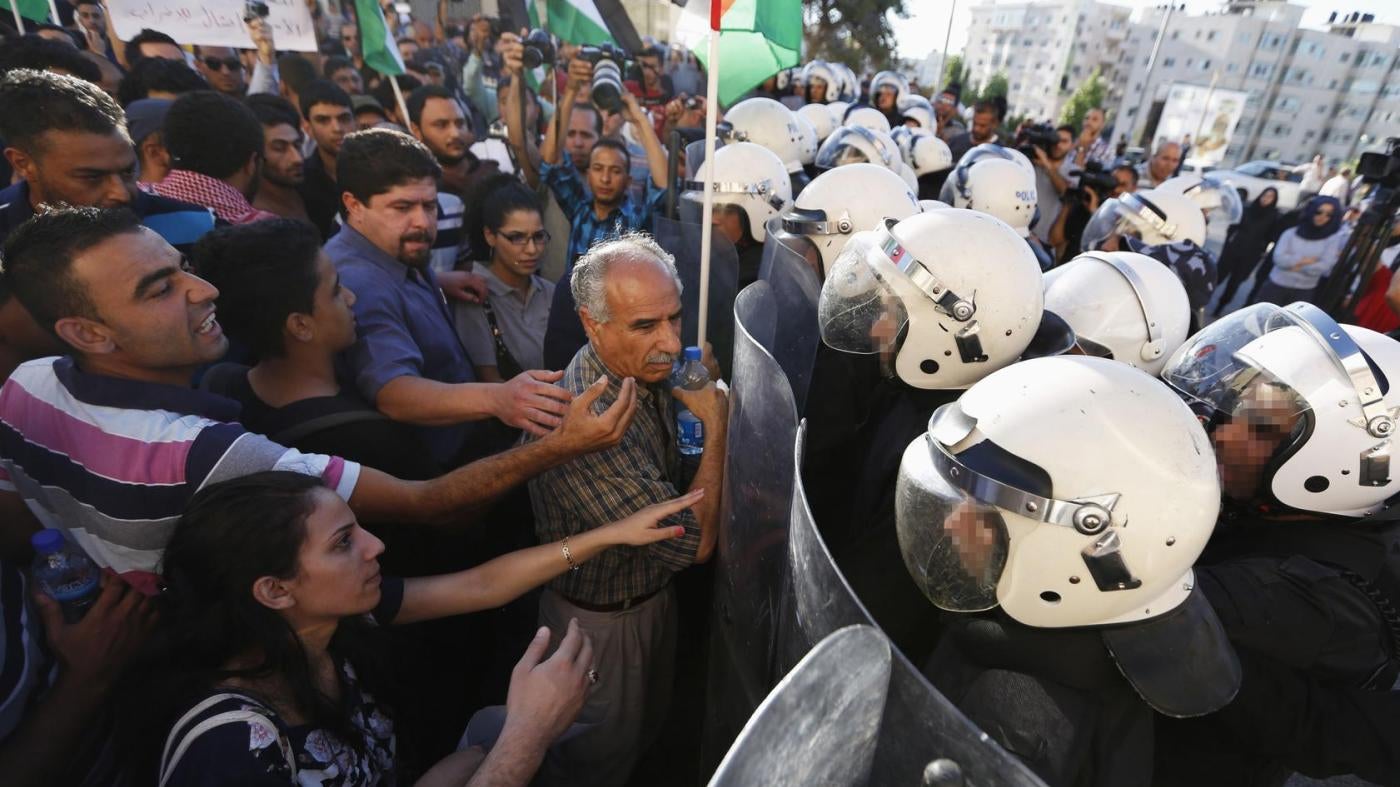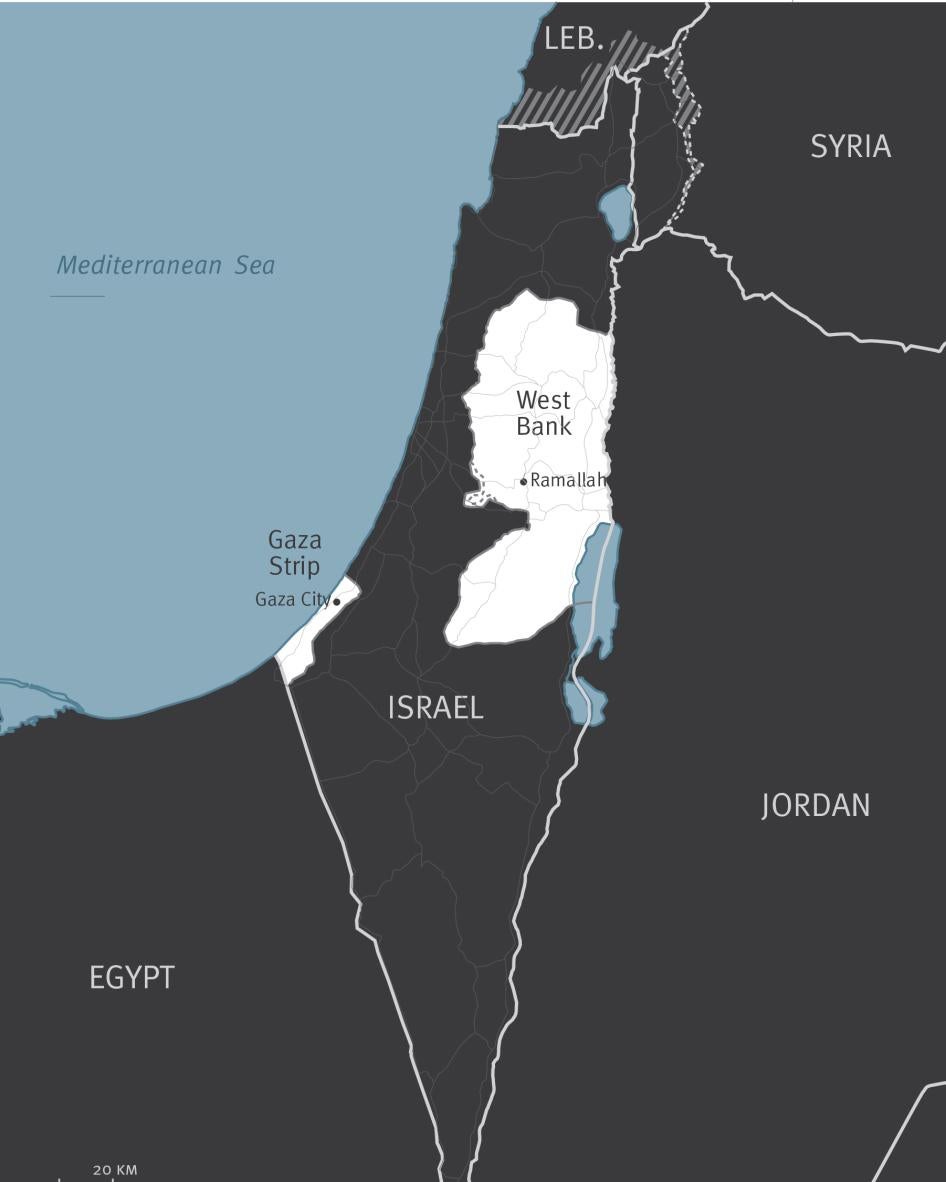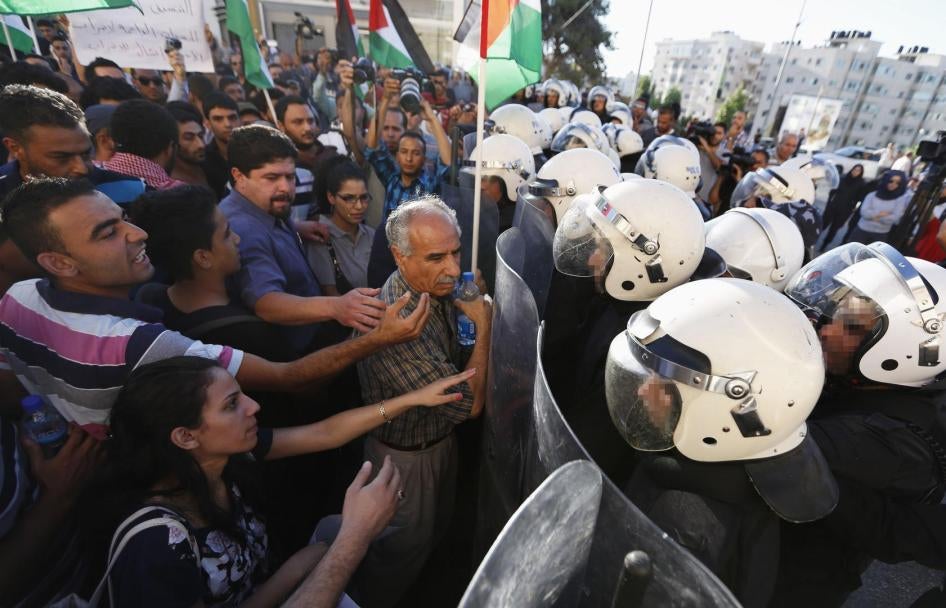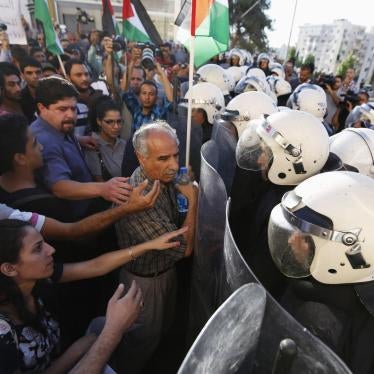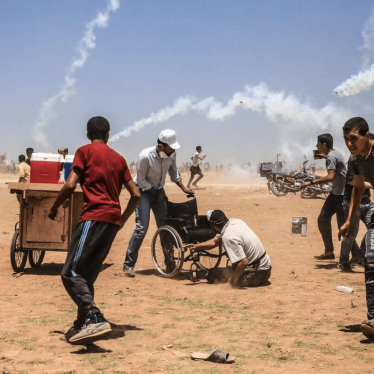What did you find?
We were able to document that rival Palestinian authorities in the West Bank and Gaza Strip are systematically arresting scores of critics for their nonviolent expression, and then mistreating and torturing them in custody. We found that the Palestinian Authority, which exercises limited autonomy in the West Bank, and Hamas authorities, who have de facto control inside the Gaza Strip, have cracked down on critical journalists, social media commentators, demonstrators, and university activists.
For the report, we documented more than two dozen cases of people detained for no clear reason beyond writing a critical article or Facebook post or belonging to the wrong student group or political movement. Some just called for or attended a nonviolent demonstration.
Those arrested are charged under overly broad laws against, for instance, “harming revolutionary unity,” creating “sectarian strife,” and insulting “higher authorities.”
What happens to those arrested once they’re detained?
Security forces routinely use torture against detainees, in particular forcing them into painful stress positions for hours at a time, including by using cables or ropes to hoist up their arms behind their back, wrenching their shoulders. In addition, officers regularly threaten, taunt, and beat detainees. The worst offenders are Hamas’ Internal Security in Gaza and, in the West Bank, the Palestinian Authority’s Intelligence Services, Preventive Security, and the Joint Security Committee, particularly in their detention facilities in Jericho.
Have you spoken with the Palestinian Authorities or Hamas about your findings?
We wrote letters to both the Palestinian Authorities and Hamas, laying out our findings and asking them a series of detailed questions. We received over 60 pages of responses from every implicated security agency. They all denied that they arrest people arbitrarily and torture them. They said these abuses amounted to no more than isolated cases that, when brought to the attention of authorities, were investigated with those responsible held to account. Our research contradicts these claims, though.
Who did you speak to for your research?
We spent two years investigating these issues, speaking to 147 people in the West Bank and Gaza, largely former detainees. We investigated 86 instances of alleged abuse. We also spoke with family members, attorneys, and doctors, and we reviewed photo and video evidence as well as medical and court documents. In addition to engaging with authorities, we also spoke with our non-governmental partners and groups that visit detention centers.
Did the case of anyone you spoke with stand out as especially troubling?
In Gaza, we interviewed Abdullah Abu Sharekh, a 55-year-old math teacher and writer who is employed by the UN Relief and Works Agency, the refugee agency for Palestinians.
Hamas authorities detained Abu Sharekh four times between January 2017 and January 2018 for his peaceful criticism. In May 2017 he wrote a Facebook post criticizing a statement made by a Hamas leader, and the next day, several men in civilian clothes showed up at his door saying they wanted to talk to him for “half-an-hour.” They took him to Internal Security headquarters, and, he told us, blindfolded him and put him in a room called “the bus,” where agents force detainees to remain standing or seated in a small chair.
This can go on for days at a time. In the bus, detainees must ask permission to talk, to go to the bathroom, sit down or to sleep. He was with 15 others. “You can’t imagine how painful it was,” he said. He had pain in his back and knee for days after his release. It’s abuse that doesn’t leave a mark on your body, so authorities can deny it. Hamas Internal Security released Abu Sharekh five days later – but only after he signed a pledge to not “slander” people in high positions in Gaza.
After these arrests, he decided to stop criticizing the authorities. It was too much to bear. “I decided to leave them alone, so they’ll leave me alone,” he told us.
We also interviewed a West Bank graduate student named Alaa Zaqeq, who was detained during a period of high tensions between the Palestinian Authority and Hamas for his involvement with the Islamic Bloc, a Hamas-linked student group.
He was having dinner with his pregnant wife’s family when eight cars from the Palestinian Authority Intelligence Services drove up and arrested him. An officer told him, “We are going to make you pay the price for the coup in Gaza,” a reference to when Hamas took control of Gaza in June 2007 on the heels of months of clashes between the Palestinian Authority, dominated by the Fatah political faction, and Hamas.
Agents eventually took him to the intelligence service detention facility in Jericho. After blindfolding and handcuffing him, officers from the Intelligence Services slammed him against the wall, saying that this was his “welcome.” They took him to a room, handcuffed him behind his back, and then attached a cloth and rope to his wrists, pulling them high, until his whole body lifted off the ground. Then an officer hit his back with a stick. They held him there for 45 minutes, he said. Officers subjected him to torture like that again and again. One of his interrogators, known as “the Juicer,” told him, “I promise you, you will not leave this place except in a wheelchair.”
Zaqeq was detained for 24 days. Under torture, he confessed to financing the Islamic Bloc on campus, even though this was not true, he said. He was released on bail, and the authorities told him they held him only to protect him from the Israelis, who also wanted to arrest him.
Two months later, the Israeli army arrested him and held him in administrative detention without charge or trial for nine months. He was released in March 2018, only to be rearrested in September and ordered placed again in administrative detention for four months.
Do Palestinian security forces coordinate with the Israeli army?
The Palestinian Authority engages in close security coordination with Israel. We found a number of cases of Palestinians detained by both the Palestinian Authority and Israel, often based on similar sets of allegations.
Why release the report now?
We began the research for this report in fall 2016. The release is tied to the 25th anniversary of the Oslo Accords, when the Palestinians gained a degree of self-rule over the West Bank and Gaza. The international community’s fixation with developing the capacity of Palestinian authorities has led it downplay their pattern of repression. Over time, the security services of both the Palestinian Authority and Hamas have grown ever-more systematic in stamping out dissent, including through arbitrary arrests and torture.
We assessed how each authority, after over a decade of divided administration between the West Bank and Gaza Strip, is dealing with supporters of the other.
Palestinian authorities have also signed a range of human rights treaties in the last few years. We evaluated how they are adhering these treaties.
What would you say to people who think you should only work on Israeli abuses in Palestine?
Our mandate has always been to stand with victims, whoever is responsible for abuses, and to document abuses by all parties using the same methodology and standards across the board. Just as we’ve been documenting for decades the institutional discrimination, repression and systematic rights abuse characteristic of Israel’s half-century occupation of the West Bank and Gaza Strip, we’ve been documenting arbitrary arrest and torture by the Palestinian Authority going back to its creation 25 years ago.
We have also condemned Hamas abuses on a regular basis – such as imposition of the death penalty after unfair trials, and the secret detention of Israeli civilians. Rights abuses by Israeli authorities are no justification for human rights groups to ignore serious repression by Palestinian security forces.
What do you want to see happen?
We want the Palestinian authorities to stop arresting and torturing critics. We also urge the United States and European countries with regard to the Palestinian Authority – and Qatar, Iran, and Turkey with regard to Hamas – to suspend assistance for forces implicated in widespread arbitrary arrest and torture until these abuses stop and those responsible are held to account.
Is there anything else you’d like to add?
Even if Israeli settlements and discriminatory systems are dismantled and systematic Israeli rights abuse end, freedom for Palestinians will remain incomplete so long as this machinery of repression remains intact.
